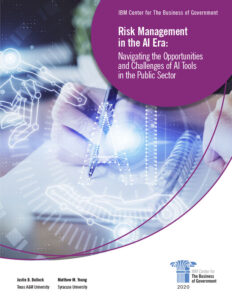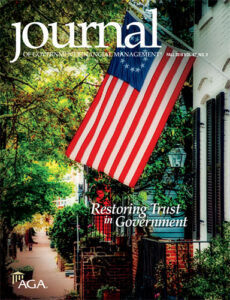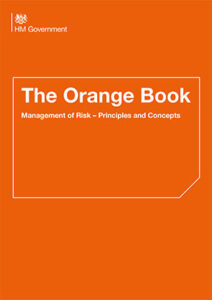 See the results from the 2017 Federal ERM Survey conducted by AFERM and PwC
See the results from the 2017 Federal ERM Survey conducted by AFERM and PwC
Federal Enterprise Risk Management 2016 Survey Results
 See the results from the 2016 Federal ERM Survey conducted by AFERM and PwC
See the results from the 2016 Federal ERM Survey conducted by AFERM and PwC
Mastering Risk: Ways To Advance Enterprise Risk Management Across Government
This Resource has been removed due to a citation error.
Risk Management in the AI Era: Navigating the Opportunities and Challenges of AI Tools in the Public Sector
 Artificial Intelligence (AI) has moved into the mainstream of businesses and government.
Artificial Intelligence (AI) has moved into the mainstream of businesses and government.
Business leaders are rushing to take advantages of the benefits that can be brought to a wide array of industries to help increase productivity. Government leaders are also moving forward, but with appropriate caution. When considering the use and application of AI related technologies, government leaders weigh different factors than their private sector counterparts. Whether it is deploying self-driving electric trolleys in a city or retrofitting city streetlights with sensors to make them “smarter,” these leaders must address issues of accountability, transparency, ethics, equity, common good, effectiveness, efficiency, managerial capacity, and political legitimacy.
The report authors put forth a threefold strategy to assist government leaders and public managers with how best to approach using AI, which includes:
- reviews of prior federal government studies on the use and application of AI. These reports reflect a number of important issues for agencies and stakeholders to consider as they begin incorporating AI; the studies also highlight the government’s broad risk management approach to AI
- a risk management framework for when and how government can and should consider using AI tools, how to use these tools, and which organizational tasks and decisions may benefit from the use of AI
- case studies of two innovative uses of AI tools to help manage risks from local governments: the City of Syracuse, New York, and the City of Bryan, Texas.
The authors close with a list of practical guidelines for government action in using AI tools to improve the overall quality of governance, while incorporating similar tools into their overall risk management strategy.
The Orange Book 2020
In successful organisations, risk management enhances strategic planning and prioritisation, assists in achieving objectives and strengthens the ability to be agile to respond to the challenges faced. If we are serious about meeting objectives successfully, improving service delivery and achieving value for money, risk management must be an essential and integral part of planning and decision-making. While risk practices have improved over time across government, the volatility, complexity and ambiguity of our operating environment has increased, as have demands for greater transparency and accountability for managing the impact of risks. This updated guidance builds on the previous Orange Book to help improve risk management further and to embed this as a routine part of how we operate.
Agency Risk Profiles, ICOR and OMB Circular A-11
 Loading...
Loading...
CFOC: DATA Act of 2014 – “Data Quality Playbook”
 Loading...
Loading...
Lessons Learned the Hard Way: Enterprise Risk Management, Public Trust and the IRS
 This article, reproduced with the permission of the Association of Government Accountants, discusses how Enterprise Risk Management has helped one federal agency recover from crisis and rebuild public trust.
This article, reproduced with the permission of the Association of Government Accountants, discusses how Enterprise Risk Management has helped one federal agency recover from crisis and rebuild public trust.
Example ERM Capability Model
